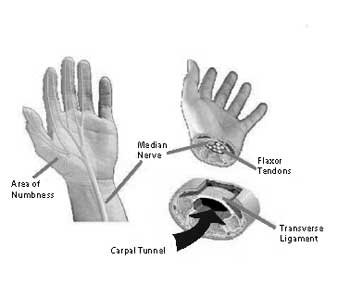
When the tunne in your wrist gives troubleCarpal Tunnel Syndrome and a painful tingling hand 'Carpal' is a medical term which refers to the wrist. A 'syndrome' is a combination of problems which doctors recognise as a particular disease or disorder. The 'carpal tunnel' lies in the wrist and the tendons which run down from the muscles in the forearm to move the fingers pass through it. It also contains an important nerve called the median nerve.
This nerve controls some of the muscles which move the thumb. It also carries information back to the brain about sensations you feel in your thumb and fingers - particularly the index, middle and (occasionally) the ring fingers. In carpal tunnel syndrome the median nerve gets squeezed - often because the tendons become swollen and overfill the tunnel - and this causes the symptoms described below. The symptoms Women are far more likely to have carpal tunnel syndrome than men. It can affect people of all ages. If you have this condition you will experience pain or aching, and tingling or numbness. The symptoms are usually worse in the thumb, index and middle fingers. Occasionally they are so severe that your whole hand feels affected and the aching may sometimes extend up into the forearm. You may find one or both hands is affected. If you are right-handed the right hand tends to be worse, similarly the left hand if you are left-handed. The symptoms are usually worse at night (when they may disturb your sleep), or in the morning when you wake up. Hanging your hand out of bed or shaking it around will often relieve the pain and tingling.
The problem may not occur during daytime, but some people find that it can be brought on by physical activities at work or home such as writing, typing, housework, knitting, etc. If the nerve is badly squeezed, the problems may continue throughout the day. The hand may feel weak, or the fingers numb or both. There is then a tendency for objects to slip out of your grasp and you may find that activities which require fine finger movements like writing or sewing become more difficult. Doctor’s examination When your rheumatologist examines your hand, he may not find anything abnormal. Nonetheless, the rheumatologist will be looking for other problems which may mimic carpal tunnel syndrome. The wrist may be swollen due to arthritis or tendon swelling and this may explain why carpal tunnel syndrome has developed. If the problem is severe the thumb, index and middle fingers may be insensitive (numb) to either a gentle touch or a pin prick. If the condition has been present for some time, the muscles at the base of the thumb may be wasted and weak. Your rheumatologist may tap over the median nerve on the palm side of the wrist. A sharp tingling pain in the fingers confirms the diagnosis. The causes In most cases there is no obvious cause. However, the median nerve within the carpal tunnel is very sensitive to pressure, and the syndrome can be caused by an accumulation of fat or fluid within the tunnel. Some people develop carpal tunnel syndrome following a fracture of the wrist if this leads to narrowing or distortion of the tunnel. Arthritis of the wrist, particularly from rheumatoid arthritis is a common cause of carpal tunnel syndrome, particularly when there is swelling of the wrist joint itself or of the tendons which run through the carpal tunnel.Other causes include fluid retention (particularly in women during pregnancy or related to periods), an underactive thyroid gland and diabetes. Sometimes the condition is mistaken for something else. Pressure on nerves in the neck due to disc problems or arthritis can cause similar symptoms to carpal tunnel syndrome. To confirm the diagnosis, doctors often perform a nerve conduction test. Small electrodes are placed on the skin just above the wrist to stimulate the median nerve. In some one with carpal tunnel syndrome there is a delay before the impulse arrives in the thumb muscles. This delay can be measured and will tell the doctor whether the nerve is badly or only slightly compressed. The treatment Diuretics (water tablets) may help particularly if you are suffering from fluid retention. If your symptoms are particularly troublesome at night it may help to sleep in a wrist splint which eases the pressure on the median nerve. Steroid injections If symptoms persist despite wearing a night splint, your rheumatologist may recommend a steroid injection. A small quantity of steroid is injected into the carpal tunnel and, although this may be rather uncomfortable, the injection can relieve the symptoms for several weeks. A steroid injection into the wrist joint itself may also be helpful if there is arthritis in your wrist. If other treatments do not make a difference and symptoms continue then surgery is usually considered. Carpal tunnel syndrome can be treated but it is important to see your Doctor early for the best chance of recovery. (The writer is Consultant Rheumatologist, Sri Jayewardenepura General Hospital)
|
|
||||||
|| Front
Page | News | Editorial | Columns | Sports | Plus | Financial
Times | International | Mirror | TV
Times | Funday
Times | Medi Scene || |
| |
Reproduction of articles permitted when used without any alterations to contents and a link to the source page.
|
© Copyright
2008 | Wijeya
Newspapers Ltd.Colombo. Sri Lanka. All Rights Reserved. |


